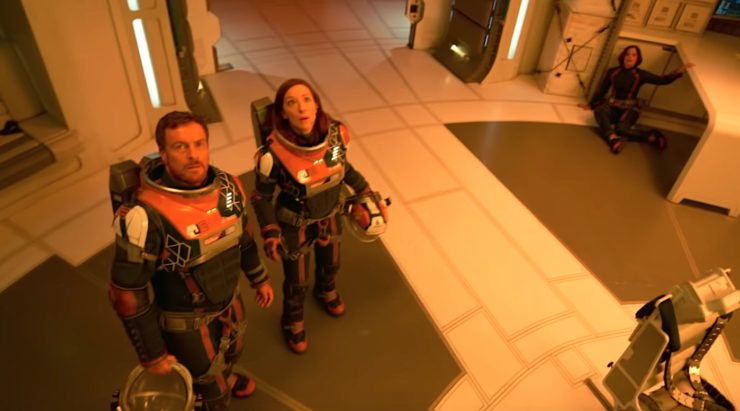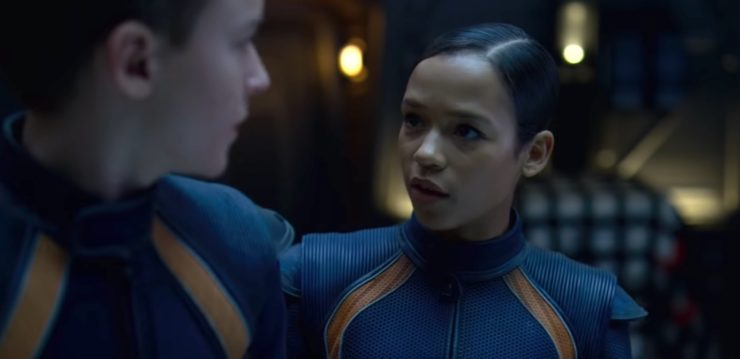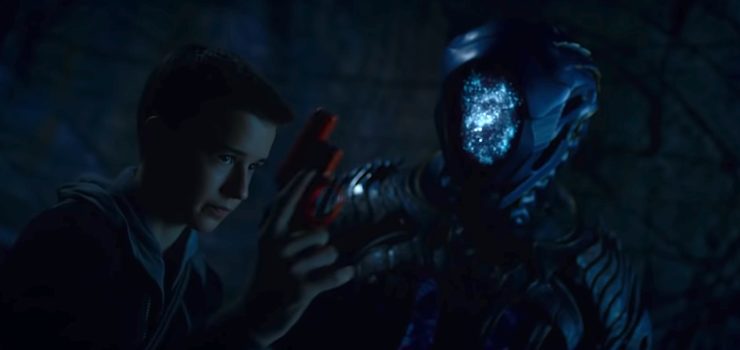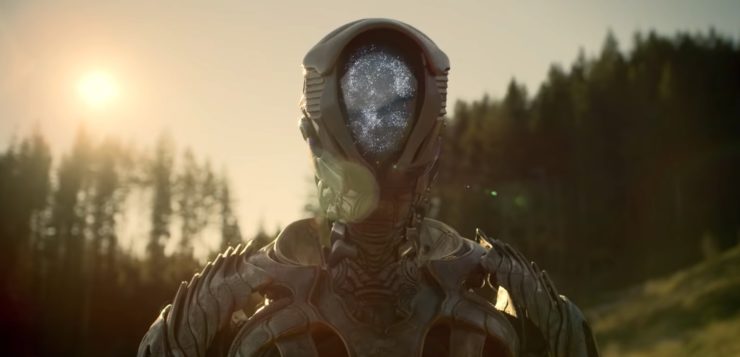While the first season of Lost in Space had the mellow hiccups one generally associates with a television show finding its voice, and the second season proved engaging and thoughtful TV that everyone could enjoy, the third (and final) season is… like getting to the bottom of a sundae, hoping for that final spoonful of fudge and winding up with a mouthful of Worcestershire sauce.
Can’t think of any other way to put it than that.
[Some spoilers for the final season of Lost in Space.]
The second season cliffhanger saw our dear Robinson family ripped in half while Judy, Penny, and Will guided the Resolute’s children to (hopefully) their Alpha Centauri destination while the adults stayed behind to deal with a robotic threat the likes of which could not be matched. The kids wound up somewhere else entirely; close to the wreckage of the Fortuna, the ship Judy’s missing bio dad captained twenty years ago when he went missing. The parents, meanwhile, readied themselves for a battle they knew they had no hope of winning.
The third season opens a year later, and we learn that the kids (plus Dr. Smith, who stowed away with the children, unwilling to sacrifice her life) have set up camp on a broken planet in an atmosphere bubble, where they’ve been working to locate enough titanium to fix an essential piece of their ship. The parents are similarly stuck trying to find an engine and a robot to pilot it for them, so they can get back to their kids.
Of course, you know Judy has to find her long lost other dad in all this.

This opening seems like it could work as a set up—despite some character regression when it comes to John and Maureen Robinson’s relationship, which is disappointing because it pulls the rote “our ability to work as a couple is now predicated on being parents” arc into their relationship without ever examining the impulse or following through on the emotional weight that carries. The goal of the first half of the season is reuniting these families, and we learn that Robot has been in contact with his pal Scarecrow (the one who was being tortured by the higher-ups on the Resolute in the last season) to that end. This is happening at the same time that the kids race to leave the current planet behind, before a bunch of meteor debris makes take-off impossible.
Buy the Book


Sisters of the Forsaken Stars
In the midst of this, Penny is adding love triangle drama to her teenage years, Will and Robot are learning about the species that built the robots (and lived on this world before an extinction event), and Judy does indeed find Grant Kelly (Russell Hornsby) and bring him along for the ride. The evil robot from last season—dubbed SAR by Will—eventually locates the wayward parents, necessitating a rescue by their kids. Everyone gets their happy reunion, but that doesn’t stop SAR from heading to Alpha Centauri with an army. Which means the Robinsons have a new job: stopping robotkind from wiping the settlement out and eliminating humanity’s last great hope for survival.
But you might find yourself asking: Why do the robots need to do this? Well, you see, when Will tries to meet with SAR and change his mind about the future of human-robot relations, he learns that SAR killed the aliens that built them, and he believes that Will is controlling his Robot via this heart that Robot speaks so highly of. “No masters,” SAR says, before stabbing Will clean through said beating organ.
I’d say it’s a little on the nose, but the robots don’t have noses.
If you watched the first two seasons of this show, you might be wondering if you missed something—because this is emphatically not the story this show appeared to be telling last season. When Netflix announced that season three would be the final bow for Lost in Space, the showrunners insisted that three seasons was their plan from the start, and that was a comfort. But it’s hard to believe that now, seeing the myriad plot threads that get dropped by the end. Season three winds up being Race Against the Machine, with a dash of (often rehashed) familial strife, and a heaping of terrible clichés that don’t really make much sense.

Why does Penny need a love triangle? Why does Will think he should sacrifice himself every time there’s a hint of danger? Why does John Robinson lose all the common sense and trust he’s built up over the past two seasons? Why does Grant Kelly arrive on the scene and then proceed to do nothing but occasionally make awkward conversation? The answer usually seems to be “because this is what the plot needs to create tension” and no reason beyond that whatsoever.
The show built its premise on the unbeatable Robinsons being capable of everything when they worked as a team, but also on the idea that humanity had maybe done some very bad things to ensure the future of our species amongst the stars. Those competing narratives made for a fascinating reflection of the world we currently occupy, where billionaires talk of colonizing Mars and making indentured servants of anyone who wants to come along but can’t afford the ride. In Lost in Space the Earth is still uninhabitable, the Alpha Centauri program still only took the best and brightest, but now none of that matters—because SAR hates humans for their (potentially controlling) hearts and plans to destroy us. All those previous ideas are dropped entirely and never brought up again.
Instead of rooting SAR’s antagonism in humanity’s mistakes on meeting the robots (as last season suggested), the entire conceit of creating and manipulating an AI slave race is relegated to a species that we never meet or learn anything about. The robots aren’t acting out against humans who have done them harm, but perpetuating a cycle that allowed them to get free of their first masters. Only there isn’t much to freedom when you spend all your time hunting down any potential threat and extinguishing it on behalf of a commander who treats you as a slave, too… which is where people and their hearts actually come into it.
What I’m saying is that Penny figures out that they can make robots their friends by helping them when they’re injured, just like Will did for Robot in the first season, and then all the kids make their very own robot pals, and this is… clever somehow? Doing the same thing over again en masse with the character who most deserved a defining moment that was unique to her because she feels constantly overshadowed by her family? We’re supposed to believe this was the plan, and there was not a network executive standing in the corner, tapping their AppleWatch, going “Speed it up, you’ve got nine script pages left and then we’re done here”?

This ending might have been just a bit more palatable if the show’s final episode didn’t have the cheesiest, bluntest dialogue I’ve heard on television since… the ‘90s, frankly. Not the good ‘90s stuff, the bad ‘90s stuff. The Hercules: The Legendary Journeys kind of stuff. Which, if that had been the show’s tone throughout, would have been fine! I liked Hercules! But Lost in Space billed itself as a much more emotionally realistic show, so it’s jarring to watch Maureen set a menacing robot up for death with the words “I’m Will Robinson’s mother!” like she just uttered a catchphrase worthy of entry in the Action Hero Annals. Sure. That battle cry seems likely from a woman who has spent the entire show being collected, competent, and all about results.
Cheesy can be fun when it’s deployed well, but the final episodes of Lost in Space are not, and so everything gets telegraphed in a deeply embarrassing way that makes you want to cringe away from the screen. At one point, the Robot heads back to the planet where his people now reside to speak to them while Will is extremely ill. Rather than accompany his friend, Will stays on the ship, blinking in and out of consciousness, and Dr. Smith narrates everything that the Robot does in this confrontation. You know, in case you don’t get it. You probably don’t—it’s very complicated watching him draw pictograms of a boy with a big heart on a rock face as everyone turns away from him. Real PhD-level interactions going on here.
Which is all to say that Lost in Space had something special going, and this final season did not live up to that promise. I’m sure the pandemic contributed to that problem, and I’m sorry those were the circumstances they were stuck with… but it’s such a shame to see it go out as a shade of its former self.
Emmet Asher-Perrin would love to give them a do-over on this season. You can bug them on Twitter, and read more of their work here and elsewhere.










